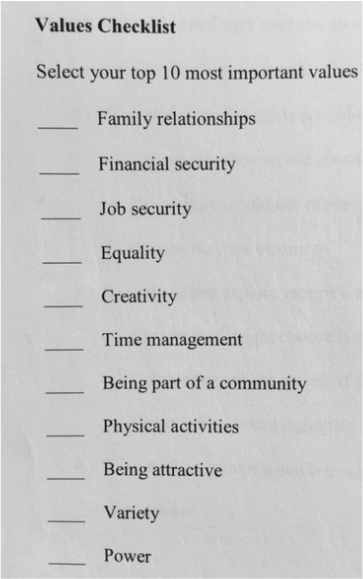|
Imagine yourself here on the edge of this lake. You have all day to spend here and you are trying to decide what to do next. How do you know whether you want to stay here at the edge, take a swim, or go to the other side? If you want to go to the other side, how do you get there? Do you go straight across, or go around the edge? If you want to take a swim, how long do you stay and what comes next when you're done? These questions are a lot like what happens in the goal-setting process in life.
Why is goal setting important? Why can't we just drift about day-to-day doing what comes naturally at any given point?...Because humans are inherently goal-driven, and if you're drifting about without a goal that you can name, you may likely feel guilty, empty, or lazy. And goals don't have to be monumental. They don't have to be pie-in-the-sky, dream-big kind of goals. They certainly can be, and I would argue that many people who feel fulfilled in their life do indeed dream big. However, setting and reaching goals involves small, ordinary, everyday accomplishments too. Here are four steps to mindfully setting goals that matter.
2. Define your expectations. Project into the future a bit, and use your imagination to create your best life. When you consider the values most important to you, how do you want to be living them out in 5 years? Imagine the specifics of your everyday life in 5 years. Who will you be with? What job will you have? Where do you live? What do you do for fun? Now, take time to reflect again on the accomplishments you've already made. 3. Make a plan. And be sure you are capable of accomplishing it. Work your way back in time towards now, and identify what actions do you need to take now to reach your 5 year goal? What is likely to get in your way, and hold you back? When making your plan, consider these important parts. What small daily or monthly tasks will help you reach your goal over time? What are the outcomes that you can measure to tell whether you've succeeded? Now acknowledge this work you've done to make a plan. 4. Re-adjust your goal and plan as needed. It's the most important step! Re-adjusting, giving yourself latitude, being honest with yourself...these are all components of self-compassion, or simply stated, being kind to yourself. Self-compassion is what will keep you moving forward even when things don't work out how you'd planned. Because things are bound to not work out sometimes. Your attitude toward yourself in the challenging moments will shape how you feel about your goal in general. Self-compassion will keep you resilient and help you recover from setbacks. And again, as you adjust your goals and plans, take time to reflect on what you've already accomplished. Praise yourself. How often do we say to ourselves, "I really did well today," or "I worked hard on this project," or "Even though I haven't reached my goal, I'm still a capable and worthwhile person and will keep trying." For most of us, not often enough. I hope you can take these steps and use them to define your goals. Whether you want a new job, a new house, to start a business, to start a relationship, to deepen a relationship you already have, or really any other life circumstance, taking time to clearly define your goals based on your values will increase the likelihood you will reach them...and feel good about your efforts.
Individual counseling at Flourish can help you identify your goals and stay on track toward them. Comments are closed.
|
AuthorKambria Kennedy-Dominguez, LPC-S |
Phone: 972.755.9120 | Fax: 214.723.5345
533 W. 12th Street Dallas, TX 75208
Privacy Policy Good Faith Estimate
©Flourish Counseling and Consultation PLLC 2024
533 W. 12th Street Dallas, TX 75208
Privacy Policy Good Faith Estimate
©Flourish Counseling and Consultation PLLC 2024



 RSS Feed
RSS Feed
